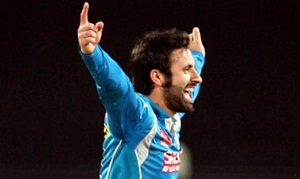Pervez Rasool has become the first Kashmiri to be selected for the main Indian cricket team. But what will it mean for people in his home state of Kashmir, where a violent anti-India campaign has killed tens of thousands of people, and most of the cricket fans support Pakistan.
Rakib Altaf
SRINAGAR: When this 24-year-old Pune Warriors player from Bibehara town of south Kashmir picked up the wicket of batting star Jacques Kallis in IPL-6, people in the valley simply burst with joy.
For many like Syed Shamim, a government teacher, it meant “People, here come the Kashmiris to IPL”. Shamim says Kashmiris had another reason not to miss the IPL matches.
“Why not, a Kashmiri was playing.”
Even the Chief Minister Omar Abdullah offered Rasool his praise on microblogging site Twitter.
The cricketer was already a star of sorts in the valley. Earlier this year, he was in great form and got seven wickets for 45 runs in the Board President’s XI match against Australia. In the Ranji trophy, he topped both batting and bowling charts for his team with 594 runs, including two centuries, and 33 wickets.
But selection in the main country team was different. “It is my biggest dream,” he told us the last time we spoke, when he was just wishing to be selected.
Today that dream has been realised.
‘Strong Message’
But senior journalist and analyst, Khursheed Wani says when Rasool is seen batting or bowling on the Indian side it will mean much more to his fellow Kashmiris. He says it will bear a strong political message.
“In Kashmir there has always been this perception that Kashmiri Muslims are not given a chance to play in the Indian team despite their talent,” he says.
Kashmiris are cricket lovers and prefer the sport over all others. Only when India is pitted against Pakistan do emotions take over.
Many youth often burst crackers each time a Pakistani batsman hits a six or a four or when an Indian batsman is sent back to the pavilion. It is just another way of showing the anti-India sentiment that runs deep, more after the armed conflict broke out in the late eighties.
In this context, Khursheed also says that if the young cricketer continues to receive the same support that he is receiving now, it would be a signal that strife-torn Kashmiri youth have changed priorities.
“Supposing that he is in the team and the match is against Pakistan. If they want his team to win, then it does mean something. Doesn’t it?”
‘Pakistan Should Win’
But a young cricket fan, Nasir Ahmed, says he will cheer for Rasool irrespective of the team he plays against. He, however, says that he would only pray that Pervez took many wickets and scored more runs.
“Rest, Pakistan should win and India should lose,” he says. “Beyond that nothing will change.”
A young businessman, Tariq Andrabi also says he would not cheer for the Indian team even if a Kashmiri cricketer is playing in it. But he still wants that Rasool be given a space in the main team.
For Andrabi, it is a matter of one’s career.
“When you have people envying those who qualified the Indian civil services then what’s wrong with playing for India. We cannot have double standards.”












